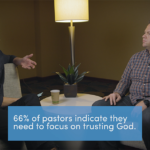
Here are eight principles that might help you and your congregation walk off the plateau and into revitalization.
By Dick Sisk
I once heard a man boasting that he could teach someone how to make a million dollars and never pay taxes. A listener asked him eagerly, “How can you do that?” The boaster replied, “First, you make a million dollars.”
With so many articles being written, so many suggestions being given, so many programs being born, and so much discouragement all around about how to make a church grow, we might feel like the listeners of the boaster.
Before we worry about the taxes, we need to first figure out how to make the million dollars.
In other words, go back to the simplicity of first things first. I’m not pouring cold water on all of the proposals for church revitalization at all. What I am saying is there may be some elementary principles we might need to consider first.
Let me give you eight principles that undergird any revitalization or church growth. The reason I call them principles rather than programs, or suggestions, or ways to grow, is because that’s what they are.
Principles undergird actions, but the actions may look different in different settings. There are no cookie-cutter answers. We must adapt principles to each particular situation.
So here are eight principles that might help you to help your church walk off the plateau and into revitalization.
1. The Sovereignty Principle
This means that the church is God’s church, not our church. That means if He’s not involved in the life and ministry of your church, nothing you can do will ever bring about lasting growth.
There have to be some “inexplicable” elements of your church — things only God could do.
Remember that “unless the Lord builds a house, its builders labor in vain,” (Psalm 127:1). Unless God’s involved and sovereignly working in your church, there’ll be very little growth of any kind.
2. The Prayer Principle
It sounds like a forgone conclusion that we must pray in the church. After all, that’s one of the things we do, right?
If we want to see God involved, then prayer must be more than a “thing we do.” It must become the wrapping around everything we do, not just one of the packages.
Prayer must permeate everything within the parameters of church life. A church that grows will be known as a church that prays.
Prayer is tied to the first principle because it’s our recognition and confession of our absolute dependence upon God.
3. The Authority Principle
The church must ring with authority. There’s only one source of truthful authority when it comes to how a man is to live his life. That authority is the Bible, the Word of God.
Our churches must be biblically centered in the Word of God.
That means our preaching and teaching must arise out of Scripture. Don’t use the Bible as a jumping-off place to expound what’s on your mind, pastor. Let God use you as a mouthpiece to communicate what the Bible says.
4. The Evangelism Principle
Evangelism is the compassionate sharing of the good news of eternal life in Christ through every means possible.
Evangelism isn’t one of the things we do as a church; it’s the thing we do as a church.
Every program ought to target, or at least include, getting the gospel to those involved. Evangelism isn’t only important for a healthy church; it’s imperative for a growing church.
5. The Leadership Principle
Someone has said everything rises or falls on leadership. That’s never truer than in the church. A pastor must know where they want to lead a church and be confident they can do it with wisdom.
In every research article I’ve read, in every example and anecdotal story I’ve known, and in every testimony I’ve heard concerning church growth, leadership was a vital element in that growth.
This means a pastor must be secure in their calling, wise in their leadership of people, and interested in building the body of Christ, not their resume.
6. The Atmosphere Principle
Every church has an atmosphere about it. Some have the atmosphere of a courtroom where everyone is on trial. Some have the atmosphere of a hospital room where everyone is quiet but supportive.
Others have the atmosphere of the neighborhood hangout. If I could choose, I’d rather have that atmosphere.
The atmosphere should mirror the opening song to the old TV show Cheers. “Sometimes you want to go, where everybody knows your name. And they’re always glad you came.”
It should be a climate of grace, welcome, excitement, and warmth. Your church will have an atmosphere. Is it a good one?
7. The Visibility Principle
It’s an absolute necessity for the church to be visible in the community where it’s located. Most churches have a reputation in their community. Sometimes, it isn’t a good one.
What do people think about when they hear the name of your church? The issue isn’t always so much that people outside aren’t coming in, but people inside aren’t going out.
A church will become known by what it does.
If the church quietly goes about helping people on the outside with needs that otherwise might not be met, it doesn’t stay unknown for long. People hear about it and associate the church with people who care.
8. The Vision Principle.
This brings us full circle, because this is tied to the sovereignty of God. What does God want to do in our church? That question should be the first one we ask when we start the process of revitalization.
When we think about what needs to happen in our church, it must be God’s vision, not our vision.
This gets God involved in the process again. A church without a vision, God’s vision, will be a church that is custodial in nature.
To summarize the principles involved in moving off the plateau:
Make sure that above all else, you seek God alone. He’ll be found, and He’s enough.
Saturate everything in prayer.
Evaluate your basis of authority.
- Keep evangelism at the center of everything you do.
- Sharpen your leadership and that of the church.
- Create a climate of warmth and acceptance.
- Utilize every means possible to heighten the church’s visibility in the community.
- Catch and cast a vision for what God wants to do through your church.
May God bless you as you serve Him, regardless of where you are serving. There are no insignificant people or pastors; there are no insignificant places or churches; there are no insignificant assignments or ministries.
Dick Sisk
Dick currently resides with his wife Barbara in Millington, Tennessee as a retired (but regularly preaching) pastor. He has pastored churches of various sizes, small to large, and is the author of Beyond the Plateau.
Excerpted from Beyond the Plateau with permission from WestBowPress.












